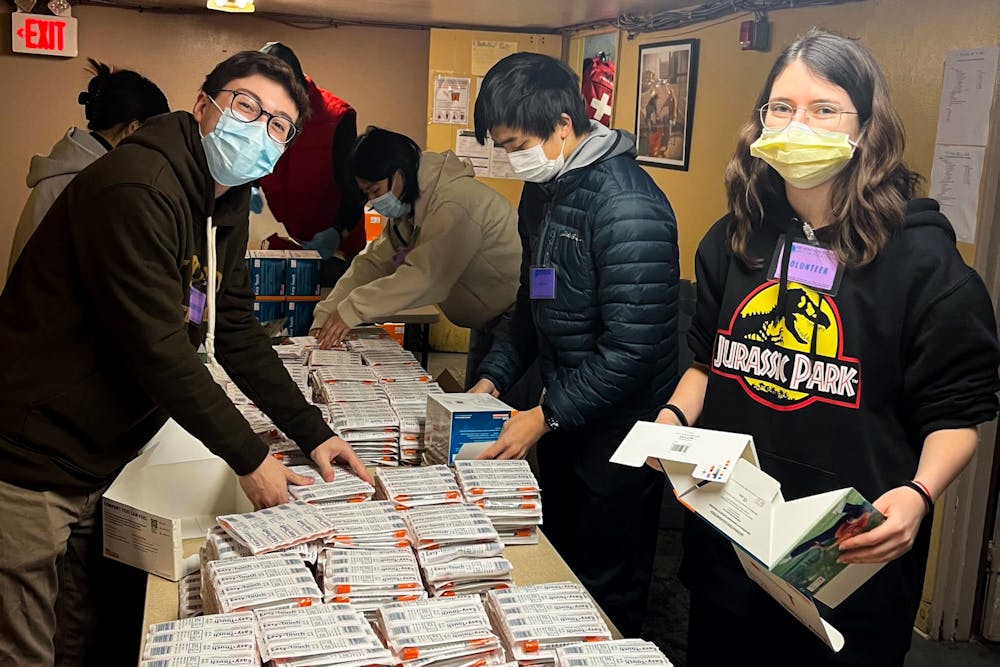
Members of the Student Harm Reduction Coalition volunteer at Prevention Point Philadelphia, a needle exchange program (Photo courtesy of Anooshey Ikhlas).
Philadelphia has long been synonymous with the opioid epidemic — the sight of discarded needles littering the streets being all too common. While needles have come to be the face of the problem, is it possible that they can also be the solution?
In efforts to promote modes of harm reduction, needle exchange programs first launched as an illicit street-based operation in response to the alarming rise of HIV and AIDS cases among intravenous drug users. Volunteers would provide sterile needles, alongside other supplies, such as cotton and alcohol wipes, that supported safer injections. Needle exchange programs (NEP) have since gained institutional support, receiving sanctions and funding from both state and municipal governments.
In recent years, debates over their necessity as a public health measure have been frequent, with many questioning whether these programs are producing more harm than good. However, NEPs have been shown to be an effective public health intervention, and should therefore be implemented in more communities struggling with substance abuse.
In Philadelphia, needle exchange program Prevention Point Philadelphia (PPP) is the oldest NEP in the country. The Kensington-based program, located at the hub of the city’s opioid crisis, initially began as an underground grassroots movement due to the state's drug paraphernalia laws. These laws, which are still in place, criminalize possession of any equipment used to consume drugs — including needles.
Prevention Point Philadelphia not only provides safe disposal of and access to needles, but also free medical care, HIV/HCV testing, as well as referrals and assistance to drug addiction treatment and recovery.
To understand NEPs, I spoke with Anooshey Ikhlas, a junior in the College studying neuroscience with a minor in healthcare management and bioethics. Ikhlas is a co-founder of SHaRC, the Student Harm Reduction Coalition, one of Penn’s newest clubs. SHaRC partners with PPP to provide support for individuals struggling with substance abuse.
Ikhlas shared her thoughts on some of the common misconceptions surrounding NEPs, emphasizing, “It’s one of those things that people will have their preconceived notions about, but it is something that can definitely change, and is changing.”
Through her work at PPP, Iklhas has seen firsthand how NEPs can benefit communities struggling with substance abuse. She notes that PPP provides not only syringe services, but a sense of community and a temporary escape from the harsh realities of drug use, sharing, “PPP is a safe and warm place to relax, watch TV, and chat with other people who understand their struggles.”
Needle exchange programs such as PPP have shown to reduce the harm associated with drug use, including the spread of blood-borne diseases, particularly HIV and Hep-C. In fact, the effectiveness of exchange programs has been investigated since 1991 by our very own, the University of Pennsylvania. In a study that recruited 415 intravenous drug users participating in exchange programs, researchers found an evident decline in needle sharing and HIV infections. In fact, over an eight year study following these participants, the Philadelphia Department of Public Health found a 34% decrease in the transmission of new HIV infections within the drug-injecting population.
PPP’s services go beyond harm reduction by providing case management services to increase individuals' access to healthcare, housing, and other vital resources. This holistic approach is crucial in supporting individuals' journey towards recovery and reducing the impact of drug use on their lives and community.
While open needles access has undoubtedly played an integral role in reducing harm among drug users, many have criticized PPP, accusing the initiatives of normalizing the administration of drugs. Other concerns include the increased disposal of used needles in public places, such as parks and sidewalks, as well as the general negative impression of exchange programs on youth and community.
Moreover, while programs often receive donations from healthcare and philanthropic organizations, most funding comes from state and federal government agencies. With limited resources, many individuals and groups believe that funding should be directed towards other initiatives, rather than wasted on regressive programs that facilitate drug use.
While it is important to address the root causes of substance abuse, the harms associated with drug abuse are an arguably more pressing matter. Consequences of drug abuse not only pose a threat to the individual at hand, but can also have society wide impacts when considering the spread of infectious diseases.
As much as eliminating drug use altogether is a noble goal, it is not necessarily a practical one — at least in the near future. The factors contributing to drug use and the transmission of HIV/AIDS are complex and difficult to address, involving social, economic, and behavioral influences. Through harm reduction strategies, such as needle exchange programs, negative consequences of drug use can and should at least be reduced, even if the usage itself cannot be stopped.
By failing to advocate for and prioritize the implementation of NEPs, we risk sending the message that individuals struggling with addiction do not deserve recognition or protection. This stance not only perpetuates stigmatization, but also ignores the reality that substance abuse affects people of all backgrounds and demographics. Through adopting a harm reduction approach and supporting such evidence-based programs, we can work towards a more just and compassionate society that prioritizes the health and dignity of all its members.
AKSA CHOUDHRY is a College first year studying health and societies from Elizabeth, NJ. Her email is aksa@sas.upenn.edu.
The Daily Pennsylvanian is an independent, student-run newspaper. Please consider making a donation to support the coverage that shapes the University. Your generosity ensures a future of strong journalism at Penn.
Donate






